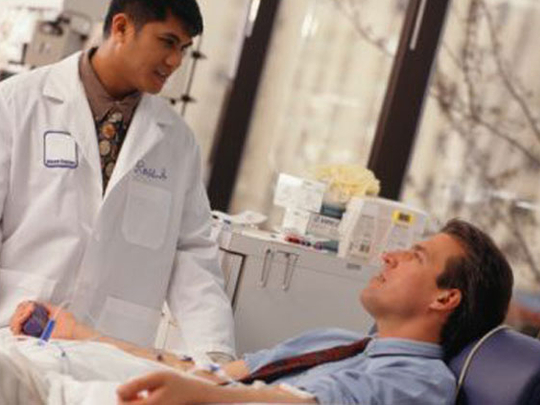
Abu Dhabi: With a monthly income of Dh2,500, Pakistani accountant, Naisar Ahmad Naeem, worries that he will not be able to make it on time to pay for the expense of a Dh200,000 liver transplant operation.
Naeem was diagnosed with Hepatitis C 10 years ago, and began receiving vaccines to help him recover from the condition.
"I recovered from hepatitis C but developed liver problems three years ago, and require a transplantation surgery," he said.
"At the time I couldn't afford it, but luckily family and friends, as well as the UAE Red Crescent Society donated Dh100,000.
"The Pakistani community here are currently collecting the rest of the money for my surgery.
"I was told if I don't do the surgery urgently, I will face severe health risks."
With a rare blood group of 0 negative, Naeem's biggest challenge was not financial: he could not find a matching blood donor.
"I have 13 brothers, and sisters, and four children and my wife," he said.
"None of their blood groups are 0 negative or 0 positive. The only person whose blood group was 0 negative was a distant relative, who unfortunately has similar liver problems," the accountant said.
Aisha Ahmad, a 35-year-old Emirati, was born with a congenital kidney disease which members of her family also have.
Doctors told her that only 16 per cent of both her kidneys were functioning.
"I have watched my mother-in-law suffer for years due to receiving a kidney dialysis for five to six hours daily, and felt her pain," she said.
"I said to myself that I would rather die than put myself through that agony. I'm still too young to suffer this way."
Luckily for Ahmad and others in need of an organ transplant, the UAE Ministry of Health (MoH) has agreed to use organs from both dead and live donors, even though the regulations regarding live donors remain unclear.
"I'm relieved the MoH has taken this step, because I know for a fact that thousands of people are suffering because they are in urgent need of an organ transplant, including seven- to eight-year-old children," Ahmad said.
"However, I believe there should be more flexibility with donors, so that they come forward and donate.
"Why not encourage drivers to donate their organs in case of an accident or death, which can be clearly mentioned on their driver's licence?" she said.
Ahmad is currently receiving pre-surgery procedures to help reduce her antibodies so her body will be more likely to accept an organ.
When she is well enough, she has decided to have the surgery performed in Egypt.












